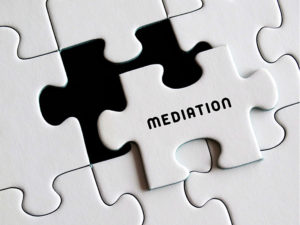 Divorce mediation is a voluntary process in which a neutral and impartial third party (mediator) facilitates communication between two or more parties who are in dispute, which may enable them to negotiate a resolution/agreement. The process of mediation allows each party an efficient and cost-effective alternative method for resolution while avoiding litigation.
Divorce mediation is a voluntary process in which a neutral and impartial third party (mediator) facilitates communication between two or more parties who are in dispute, which may enable them to negotiate a resolution/agreement. The process of mediation allows each party an efficient and cost-effective alternative method for resolution while avoiding litigation.
Key Qualities of the Divorce Mediation Process
Impartial, Neutral, and Safe – The mediator’s responsibility is to provide equal and impartial assistance to each participant that favors no interests of either party over the other, nor does the mediator favor any particular result in the mediation process other than to assist the participants in reaching a mutually agreed upon settlement. The mediator is also responsible for providing an environment that allows participants to engage in open communication in an informal setting that is free from coercion or intimidation.
Collaborative – No participant in a mediation process can impose anything on the other as everyone is encouraged to work together to resolve issues and reach fair and equitable agreements.
Empowerment – Each participant has both decision-making power and veto power over the provisions of the mediated settlement agreement (MSA).
Informed – The mediation process allows the opportunity to obtain and incorporate both legal and expert advice/information as needed to assist the participants in reaching mutually agreed upon decisions.

